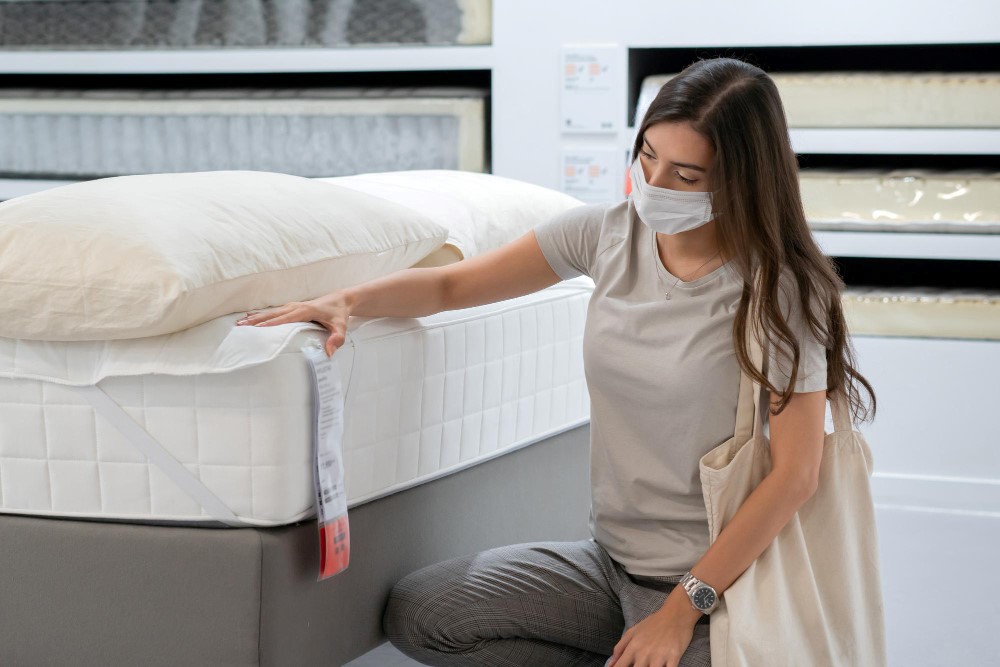We all desire to wake up every day with radiant and brighter skin, reflecting our inner beauty, refreshed mood, and energetic attitude, just like they show in commercials. However, we often fail to achieve that goal due to a lack of information, some mistakes, and other circumstances. Unquestionably, in order for our skin to glow like sleeping beauty, it needs to receive the same attention before and after bed as it does during the day.
Our skin works as a protective shield for our body during the daytime against environmental aggressors while it goes on restoration mode as soon as the sun goes down.
A night of adequate and regular sleep helps us gain skin benefits like,
- Improves blood flow: A lack of blood flow around the eyes produces sloshing, which results in dark under-eye circles. Getting enough sleep improves blood flow to the upper layer of your skin, especially your face, and lessens puffiness around the eyes.
- Aids in the synthesis of collagen: Your body produces growth hormones while you sleep, which benefit your body in many ways, including cell creation and collagen repair. Collagen is necessary to prevent wrinkles from forming.Your skin produces enough collagen thanks to the growth hormones to stay supple and taut. It also allows your skin to heal acne scars and other conditions all over your body.
- Helps in the prevention of fine lines: While you sleep, your body also creates melatonin, which functions as an antioxidant to protect the skin from UV rays, thereby delaying the appearance of wrinkles, dark spots, and skin cancer.
Melatonin also supports cell growth and maintenance of radiant, healthy skin.
Aside from getting enough sleep, which varies depending on the individual, here are some tips to help you wake up with a youthful glow every morning.
Table of Contents
Wash your face
One of the basic things that can help you retain your beauty for a longer period is washing your face frequently. Throughout the day, intentionally or unintentionally, we touch our face making it the dirtiest place on our body. Furthermore, using several cosmetic products, pollution, and other environmental elements can negatively impact your face.
Washing your face can help minimize the spread of acne-prone germs, create a cleaned surface for nightly skin creams, and result in healthier, better skin in the morning. It also helps us avoid transferring germs to our bed or mattress and preserve hygiene.
Use moisturizer
Many people think that our skin breathes during the night and avoid applying moisturizers; however, it’s a very wrong assumption as there is Many individuals believe that our skin breathes throughout the night and hence avoid using moisturizers; however, this is an incorrect belief because your skin has no respiratory system. In reality, our exposed skin is more prone to drying out rapidly because the skin’s natural moisture evaporates without any exterior protection. When our skin loses its natural moisture, it becomes dull and exhausted, hastening the appearance of aging symptoms such as fine lines and wrinkles. It also causes skin outbreaks, which further harm the skin.
Applying a moisturizer appropriate for your skin type is important since the skin’s hydraulic conductivity rises at night. It allows moisturizer to active components infiltrate much deeper into the skin, benefiting your skin cells tremendously.
Use products with vitamin C or A
The antioxidant properties of vitamin C aid in the repair of any damage done to your skin by the sun during the day. Vitamin C also promotes collagen synthesis. Thus, external application or intake of Vitamin C supplements can also help accentuate collagen levels.
On the other hand, Vitamin A can help reduce pore size, cleanse acne-prone skin, and firm dull, sagging skin by increasing collagen formation. Furthermore, sunlight deactivates retinoids, increasing the skin’s vulnerability to dangerous UV rays, and external Vitamin A functions as retinoids; therefore, it’s best used at night.
Manage Water intake
Well-hydrated skin is more vibrant and luminous. As a result, the most simple and least expensive way is to hydrate your skin. Maintain a proper water intake throughout the day. Drink water if you wake up thirsty at night; it will improve your skin and sleep.
Our skin is most dry when we get up due to nightly transepidermal water loss. Transepidermal water loss occurs when water evaporates from the skin’s surface. As a result, although drinking water is crucial for avoiding dehydration and improving general health, using a humidifier to prevent moisture loss from dry sleeping environments also works wonders.
Maintain room temperature
At night, your body starts to cool itself by widening the blood vessels in your skin. When your body temperature lowers at night, your hands and feet get warmer at first because your body allows heat to escape via them to lower your core temperature.
If the temperature in your sleeping environment is excessively hot or cold, it may alter the drop in your body’s internal temperature and cause you to have interrupted sleep. Sleep deprivation can lead to poor skin and premature aging.
Selection of mattress and pillows

On average, we sleep about eight hours every night and regularly lay our faces and body on the same sheets, mattresses, and pillows. It results in the shading of the day’s residue decaying, producing even more germs, causing breakouts, inflammation, and discomfort.
Furthermore, when your core temperature lowers a few degrees throughout the night and emits heat into your surroundings, the mattresses are the closest items that collect the most of the body heat, resulting in interrupted sleep and skin damage.
So, when shopping for the best mattress online or offline, remember that each bed type has various materials and qualities and a variable heat absorption rate.
Sleep on your back
Many individuals are accustomed to sleeping on their side or stomach. However, sleeping on a rough cloth material can irritate your skin and pressure your face for extended periods, resulting in creases. At the same time, wrinkles on the face and body can be triggered by sleeping on our stomachs or sides.
As a result, it’s recommended to sleep on your back to prevent more skin stimulation, which contributes to premature skin aging.
Also, resting on your back necessitates spine support, so when you buy mattress online, ensure that it is strong enough to support your back to avoid spinal problems.
If you still prefer to sleep on your side, invest in an epidermis pillow, like a satin or silk pillowcase, which reduces skin irritation and constriction.
Stick to a schedule
According to research, following a consistent sleep schedule helps enhance numerous bodily attributes such as the immune system, circadian rhythm, and brain stimulations; our skin is no exception. Regular sleep pattern helps our skin maintain its circadian cycle and enhances skin repair and restoration functions. Consequently, you will not only feel rejuvenated, but your skin will also appear revitalized. Because our skin cells repair the most when we sleep, obtaining a good night’s sleep is essential for achieving beautiful skin.
